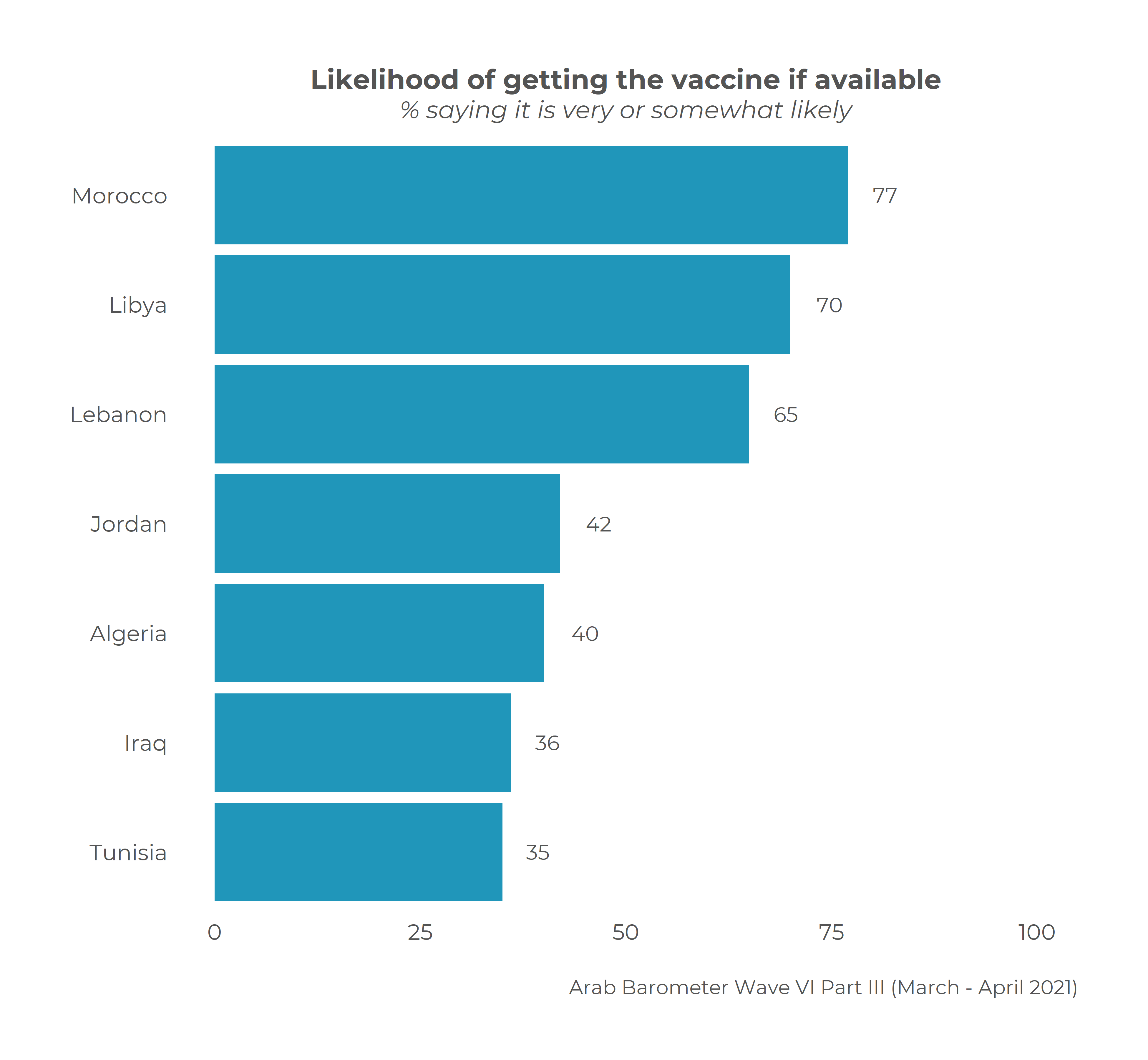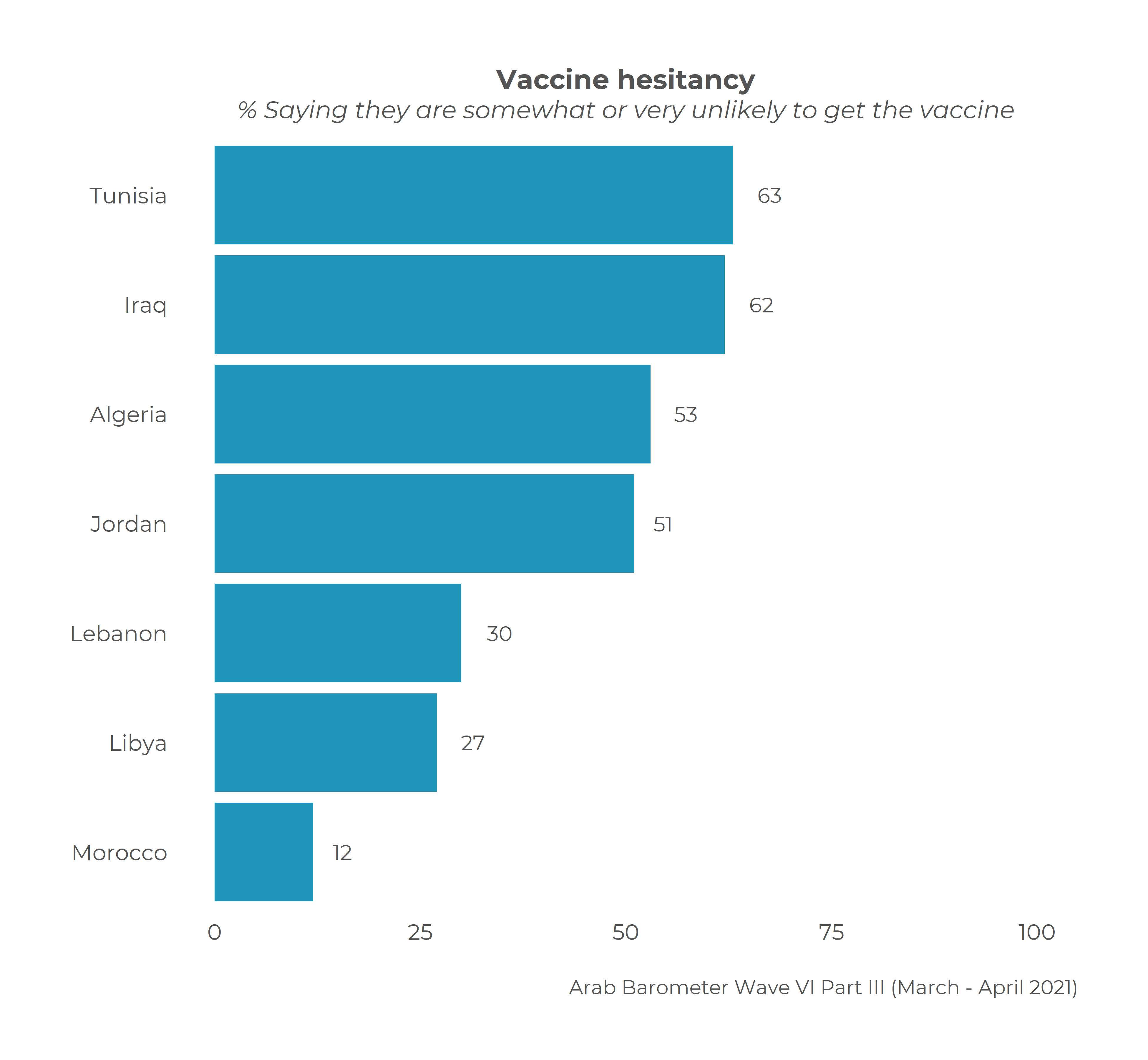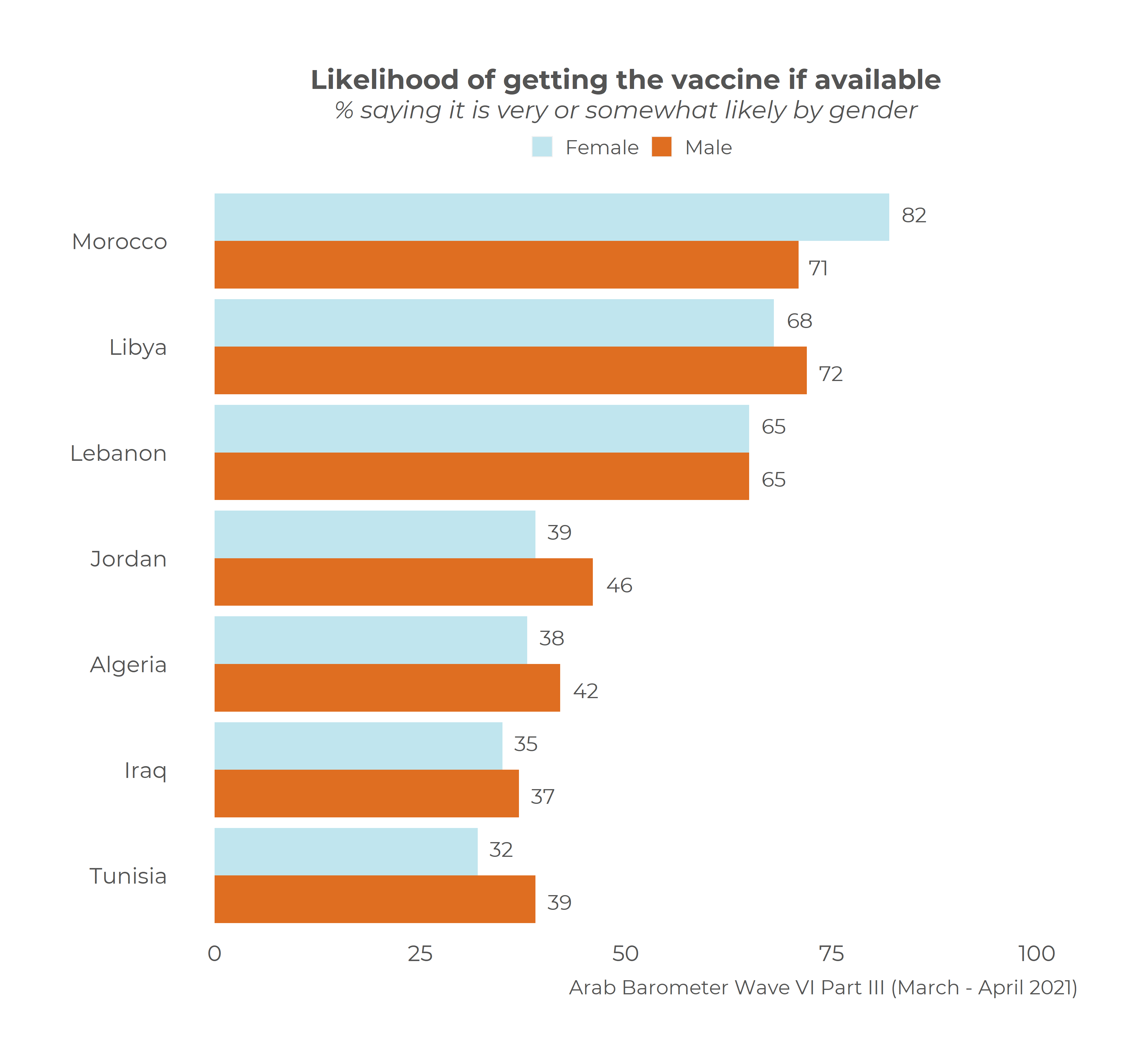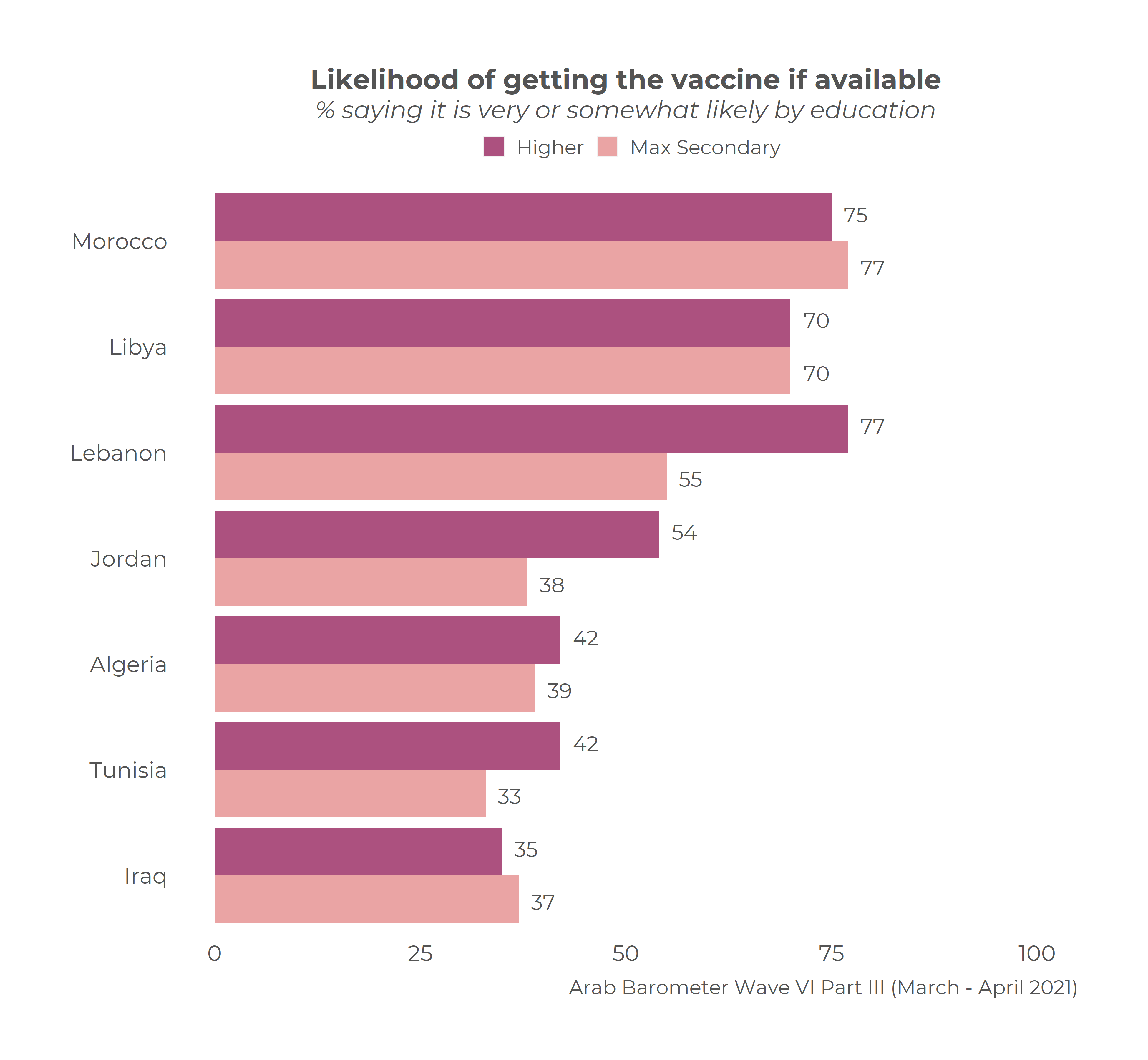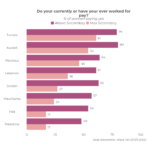MENA countries have differed substantially in their reaction and response to the COVID-19 pandemic. A regional comparison shows richer countries administering larger quantities of vaccines, relative to their population, than the non-oil exporting countries. Arab Barometer’s Wave VI, which concluded its third survey in March-April 2021, has revealed another troubling trend: vaccine hesitancy among large swaths of the MENA population. Among the seven countries surveyed, majorities in Algeria, Iraq, Jordan, and Tunisia reported they were “somewhat” or “very” unlikely to receive a free vaccine. Only Lebanon, Libya, and Morocco reported majorities in favor of vaccination. These high levels of hesitancy may undermine societal and economic recovery, and without widespread acceptance, public inoculation efforts will stall, thereby risking a prolonged COVID crisis.
One explanation for these results could be that low trust in government corresponds with lower acceptances of vaccines. After all, government response has been the center of public perception and debate throughout the pandemic. To assess this relationship, I studied two questions from Wave VI that recorded responses during the initial phases of vaccine rollouts. The first asked about trust in government and the second asks how the likelihood of getting vaccinated. On the face of it, high levels of public trust do appear to correlate with high levels of vaccine acceptance. The top two countries in terms of government trust- Morocco at 48 percent and Libya at 44 percent- are also the top two countries in terms of vaccine acceptance, 77 and 70 percent, respectively. As Salma al-Shami recently noted, the Moroccan government is among the best performers in the region when it comes to the overall public response to COVID. At the time of the survey, 10 percent of Moroccan respondents reported already receiving at least one dose of a COVID vaccine. Lebanon, however, bucks the trend with 4 percent trust in government and 65 percent willing to get a vaccine. Similarly, the difference between reported trust in government in Libya (44 percent) and in Jordan (43 percent) cannot account for a nearly thirty point disparity in vaccine acceptance. The results of a straight comparison between these two variables does not explain why some countries are willing to sign up for vaccines in large numbers and others are not.
Interpreting levels of trust in government does require analyzing local trends and contexts. In this post, Abdul-Wahab Kayyali argues that two possibilities need to be considered: first, some respondents overreport their support as a byproduct of an oppressive political environment; and second, levels of trust need to be analyzed in their country-specific context without comparison. In comparison with Wave V, the governments of Iraq, Jordan, Libya, and Morocco recorded higher levels of trust in the first survey of the pandemic. Since that initial survey, however, regional trust has uniformly dipped or dropped. Thus, relative comparisons between MENA countries must account for an initial bump in trust in 2020, followed by a decline in 2021.
Yet disaggregating respondents’ level of education and gender from these results does produce two generalizable findings. First, higher levels of education correlate with lower trust in government, while tending toward higher, and more prominent, support for vaccines. In all countries, respondents with a maximum of a secondary education reported higher trust in government than those with higher levels of education (university or above), except in Libya where both levels are tied at 44 percent. In Morocco, Libya, and Iraq, higher education does not corelate with a larger likelihood to get a vaccine. However, in Lebanon, Jordan, and Tunisia, higher education attainers reported double digit differences with secondary education recipients, reaching as much as a 22 percent difference in Lebanon.
Second, and perhaps most startling, male respondents are reportedly more likely to receive a vaccine than women. Moroccan women, with a supermajority of 82 percent, appear to be the most likely group to be vaccinated by gender and country, but outside this exception (and in Lebanon where the genders are evenly split), men are more likely to accept a vaccine by 2-7% depending on the country. These responses are consistent with results from an Austrian survey, a French survey, and an Israeli survey that show women are initially less willing to accept vaccines than men. A survey of ten developed nations describes this as “COVID’s Gender Paradox” that although women tend to be more compliant with preventative protocols, they “agree less than men to be vaccinated and to make vaccination compulsory.” The latest wave 6 results show that women across the MENA region tend to be more trusting of government by 3-11 percent depending on the country, except in Libya, where men report more trust, and Lebanon, where results are tied. Further analysis is needed, but this gendered analysis reveals an initial apprehension of women to vaccines despite their trust in government.
Clearly, based on these results, many MENA citizens were initially skeptical of COVID vaccines. While trust in government throughout the region is low and declining, mistrust in government does not appear to drive mistrust in vaccines. This raises the question, if not this, then what? Other factors could explain this phenomenon, from health concerns, such as with the AstraZeneca vaccine or the global reach of conspiracy theories. In particular, women’s reported skepticism of vaccines deserves more study, especially at the local level. In addition to problems of supply and logistics, MENA governments may face a problem with demand. Whether selective incentives or straight-up coercion (a regrettably favored regional tactic) will work in overcoming a hesitant public remains to be seen, but the clock is ticking.
Check out the infographic on Vaccine Hesitancy in MENA here.
Zachary Bamtpon is a recent graduate from Princeton University and a Center for Arabic Study Abroad (CASA) 2021-22 Fellow in Amman, Jordan.
